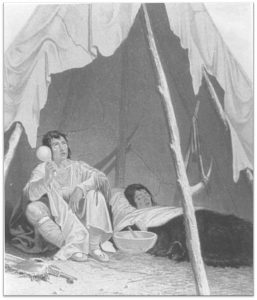11 Colonization
Before the arrival of European explorers and traders, North America was occupied by Indigenous Peoples living and thriving with their own distinct cultures, languages, and ways of knowing. Today, while many Indigenous people are very successful in business, law, medicine, arts, and sports, Indigenous Peoples as a group are at the negative end of every socio-economic indicator. How did this happen?
The short answer is colonization.
What is colonization?
In Canada, colonization occurred when a new group of people migrated to North America, took over and began to control Indigenous Peoples. Colonizers impose their own cultural values, religions, and laws, make policies that do not favour the Indigenous Peoples. They seize land and control the access to resources and trade. As a result, the Indigenous people become dependent on colonizers.
Today many Indigenous people still struggle, but it is a testament to the strength of their ancestors that Indigenous People are still here and are fighting to right the wrongs of the past.
Go forth, nor bend to greed of white men’s hands,
By right, by birth we Indians own these lands.– Emily Pauline Johnson (Tekahionwake, 1861–1913; Mohawk/English poet and performer), from “A Cry from an Indian Wife”.
Before the arrival of European explorers and traders, Indigenous Peoples were organized into complex, self-governing nations throughout what is now called North America. In its early days, the relationship between European traders and Indigenous Peoples was mutually beneficial. Indigenous Peoples were able to help traders adjust to the new land and could share their knowledge and expertise. In return, the traders offered useful materials and goods, such as horses, guns, metal knives, and kettles to the Indigenous Peoples. However, as time went by and more European settlers arrived, the relationship between the two peoples became much more challenging.
The myth of terra nullius
European map-makers drew unexplored landscapes as blank spaces. Instead of interpreting these blank spaces as areas yet to be mapped, they saw them as empty land waiting to be settled. When settlers arrived in North America, they regarded it as terra nullius, or “nobody’s land.” They simply ignored the fact that Indigenous Peoples had been living on these lands for thousands of years, with their own cultures and civilizations. For the settlers, the land was theirs to colonize. As time went on, more and more settlers took over the traditional territories of Indigenous Peoples.
Changing names and rewriting history
The settlers began to give their own names and descriptions to the land they had “discovered.” For example, Vancouver and Vancouver Island are named after Captain George Vancouver, who was born in England in 1757, and not after a hereditary Chief of the territory, whose family had lived in the area since the beginning of time. The land, landmarks, bodies of water and mountain ranges already had names, given to them by Indigenous Peoples. Settlers did not learn these names and made their own names for landmarks, mountains, bodies of water and regions instead. This was one of the ways in history was rewritten to excluded Indigenous Peoples contributions and presence.
Competing priorities and worldviews
Initially, the relationship was mutually beneficial for settlers and Indigenous Peoples, but this relationship did not last. Each group had their competing priorities based on fundamentally different values such as:
- the role and place of women
- ownership and use of land
- who should govern and run the society
- education and child-rearing
Colonizers used their numbers, laws, policies, and powers to gain control of Indigenous Peoples, thus leading Indigenous Peoples to be dependent on colonizers.
The colonizers’ worldview
The British and French were fighting for control of North America, which they viewed as a rich source of raw materials. In their worldview, the natural environment was a resource that could be exploited for individual gain. Individuals and companies could become very wealthy by controlling the resources of this “New World.” The colonizer worldview valued competition, individualism and male-superiority.
The Indigenous worldview
In contrast, Indigenous Peoples value the group or the collective more than the individual. Each person has their role, and each contributed to the success of the group. Extended families were large and included aunts, uncles, cousins, and so on.
Indigenous Peoples viewed women as being equal to men. Women were supported, honoured, and respected for their role as the givers of life.
In the Indigenous worldview, everything has a spirit and deserves to be respected. The natural world was not simply a resource to control or conquer.
Justifying colonization
The colonizers thought they were superior to all those of non-European descent, and some did not consider Indigenous Peoples to be “people” at all. They did not consider Indigenous laws, governments, medicines, cultures, beliefs, or relationships to be legitimate. They believed that they had the right and moral obligation to make decisions affecting everybody, without consultation with Indigenous Peoples. These beliefs and prejudices were used to justify the acts and laws that came into being as part of the process of colonization.
The impact of disease
When the Europeans arrived, they brought smallpox and other diseases that were previously unknown in North America. The Indigenous population had no immunity because, unlike the Europeans, they did not have centuries of exposure to these diseases. It has been estimated that as many as 90%–95% of the Indigenous population died from these introduced diseases.

A punishment from God?
These deadly epidemics happened before either the settlers or Indigenous Peoples properly understood the causes of disease. Christian missionaries told Indigenous people that one of the reasons for their sickness was the fact that they did not believe in the Christian God and did not attend church. Indigenous people saw that the settlers were not as badly affected by disease, and many were persuaded to abandon their traditional beliefs and convert to Christianity.

